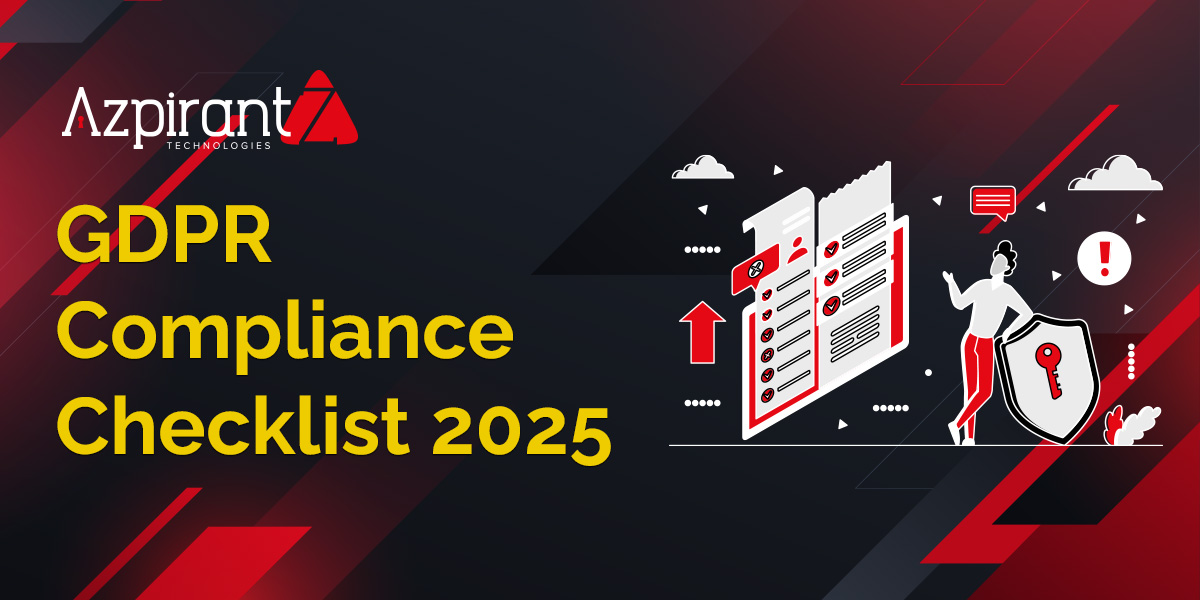Protecting personal data in today’s world is not just a legal requirement, but it is also vital in building the trust. The General Data Protection Regulation (GDPR) is still one of the most important privacy laws in the world on guiding how the companies can handle the personal information. Especially in 2025, where more data is being collected, staying GDPR compliant is important than ever.

Even if you already have a privacy plan or starting all over from scratch, this checklist would helps you to follow the GDPR rules.
GDPR Compliance Checklist for 2025:
1. Know Your Data: What You Collect and Why:
- Data Inventory & Mapping: What personal data you collect, how it flows through your systems, where it comes from, who accesses it and where it is stored all this data should be documented. This helps in decision-making and remove the hidden data risks.
- Purpose Limitation: Avoid collecting unnecessary data and also make sure that each data collection has to be clearly defined and lawful purpose.
2. Update Privacy Notices and Consent Mechanisms:
- Transparent communication: Ensure your privacy notice is clear and easy to understand, and it should be easy to find your application and must provide the justification on why the data is being collected, legal reason for doing so and the rights people have over their data and how can they contact you.
- Valid Consent: Consent is your legal basis and ensure it is explicit, freely given and easy to withdraw.
3. Verify Your Legal Basis for Processing:
- Lawful Processing: Ensure you have a valid reason that provides proper justification for collecting and using personal data. This could be things like user consent or a legal duty.
- Document Everything: GDPR’s accountability principle requires maintain records of processing activities like sort of a written proof of why you are using someone’s data. If it is for the legitimate purposes, you must explain how it helps your business.
4. Strengthen Data Security Measures:
- Technical Safeguards: Implementing the technical tools like encryption, firewall and strong passwords and secure coding to keep data safe.
- Organizational Safeguards: Conducting training and awareness sessions to the employees on how to protect data and also make sure to set clear rules for using devices and how to report the problems.
- Incident Management Plan: Make sure the Incident Response plan is tested on regular or periodic basis. GDPR requires to notify the authorities within 72 hours of the breach where any kind of personal data is at risk.
5. Respect Data Subject Rights:
- Easy Access and Correction: Processes should set up to respond to the Data Subject Access Requests (DSARs) within 30 days and it should be simple for the individuals to access and delete their data.
- Support All GDPR Rights: Data Portability, objection to processing or restriction of processing these kinds of requests must have to be respond quickly and clearly.
6. Manage Third-Party Risks:
- Review Processor Contracts: Data Processing Agreement (DPA) must have to be signed if there is any service provider processing data, because it defines the roles, responsibilities and the data handling expectations.
- Conduct Risk Assessments: Evaluation of the vendors through conducting the vendor risk assessments by asking about their technical controls, breach history. And also, the high-risk vendors may need the reviews or audits on day-to-day basis.
7. Appoint a Data Protection Officer (DPO) when required:
- Know when it’s Mandatory: GDPR require appointing a DPO if the core activities involve in large-scale monitoring or handling of sensitive information such as the personal data.
- Ensure Independence: A DPO has to operate independently and the individual need to have expertise or the in deep knowledge of GDPR and should report directly to the senior management.
How Azpirantz Helps You Turn GDPR Compliance Into a Strategic Advantage
At Azpirantz, we don’t just help you tick compliance checkboxes—we help you build a resilient, future-ready business. Our specialized Information Security Consulting services are designed to align your operations with evolving regulations like GDPR, while strengthening your overall security posture. From data audits and breach response planning to AI compliance and privacy-by-design strategies, Azpirantz enables you to treat GDPR not as a burden, but as a competitive edge in 2025’s data-driven economy.
Explore GDPR and security consulting services at Azpirantz
*The content is released by Azpirantz Marketing Team.